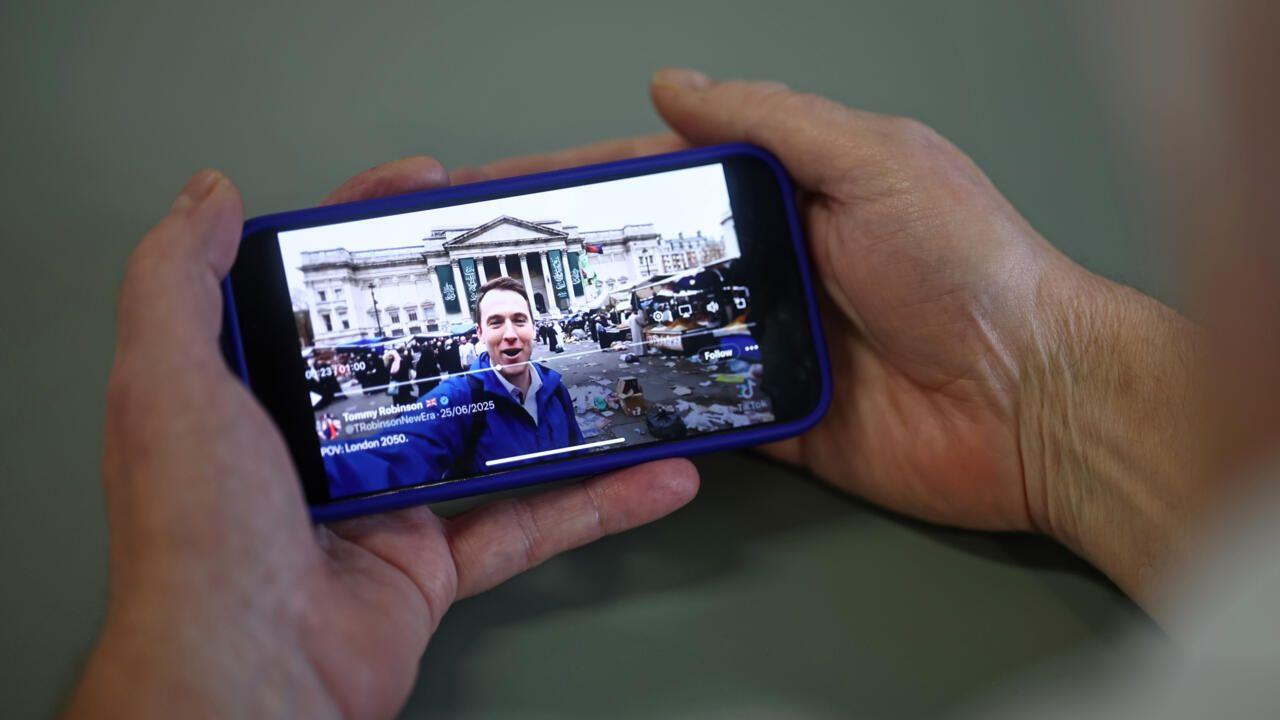AI-Generated Hitler Deepfakes Raise Concerns on TikTok
2 Sources
2 Sources
[1]
Far-Right Groups Use AI to Spread Hitler Deepfakes, Report Warns - Decrypt
Far-right groups are leveraging artificial intelligence to spread deepfake videos of Adolf Hitler and other pro-Nazi imagery in an attempt to generate sympathy for the tyrant, according to a recent report by the UK-based non-profit Institute for Strategic Dialogue (ISD). Founded in 2006, the institute is a political advocacy organization that tracks disinformation and hateful speech online. According to its most recent report, the ISD noted that AI voice generators were used to create English-language versions of Hitler's speeches, with these videos accumulating over 50 million views across X, YouTube, TikTok, and Instagram in 2024. "Social media platforms have long struggled with the spread of neo-Nazi ideologies, but the direct glorification of Hitler and the revisionism surrounding his role in the Holocaust present a new, unique threat," the Director of Technology at the US branch of the institute, Isabelle Frances-Wright, told Decrypt. "AI has further exasperated this threat, enabling bad actors to disseminate Hitler's rhetoric to a broader and younger audience." The ISD reported that many TikTok videos featured 20-30-second clips of Hitler's speeches in English with background music, promoting antisemitic, anti-Muslim, anti-immigrant, and white supremacist messages. "Hateful content, whether legal or not, tends to go viral on most social media platforms," UCLA Professor of Information Studies Ramesh Srinivasan told Decrypt. Since August, videos and posts of Hitler and Nazi iconography have garnered over 28.4 million views on X, TikTok, and Instagram, the report said. "Analysts were able to easily detect content on X that was likely violative of its policies, with just 11 posts receiving more than 11.2 million views over a one-week period," the report said. "This content was more readily available than on other platforms via basic searches." In a 2023 update to its policies, X said the platform prohibits "hateful content," including incitement, slurs, dehumanization, and hateful imagery, including profile pictures, usernames or profile bios. "The classic challenge we've been trying to regulate is the role of algorithms," Srinivasan explained. "These computational rules apply to all data and posts, and are trained to push content that is more likely to go viral. As a result, the most visible content is often the most harmful." Meta, TikTok, and Google did not immediately respond to requests for comments by Decrypt. Srinivasan said that who was ultimately creating the content was likely a blend of troublemakers and would-be political manipulators: "On one level, there is the hacker; on another, more sophisticated, psychometric and psychographic targeting." he said, referencing the role Cambridge Analytica played during the 2016 U.S. Presidential election. "That's a huge part of what powers the internet right now," he said. "It has real material effects, especially in places without a strong media," he said. "Disinformation, hate speech, and fringe speech promoted by those with significant followings are intentionally crafted to go viral. This type of content captures attention, but it is also tearing us apart."
[2]
TikTok bad actors harness AI to reanimate Hitler's hate
TikTok's AI investments are being co-opted by pro-Nazi accounts. Credit: Omer Taha Cetin/Anadolu via Getty Images Generative artificial intelligence is reviving the terrifying legacy of bigots, including former German dictator Adolf Hitler, as TikTok users harness the app's AI tools to reanimate xenophobic speeches from long-dead leaders. The phenomenon was recently documented in two different reports, one by nonprofit watchdog group Media Matters for America and another in an investigation by the Institute for Strategic Dialogue and the SITE Intelligence Group, published by the Washington Post. Both unveiled a small network of accounts creating and disseminating translated, AI-dubbed versions of Hitler's speeches. According to Media Matters' research, AI-generated audios have accumulated millions of views, which include videos mocking the leader or those that have turned the audio into a meme. Other accounts appeared to be dedicated to creating and sharing these audios earnestly, sometimes with outrightly anti-Semitic messaging. Popular videos using said audio, often stylized with slowed down and "reverbed" audios, go as far back as April 2024, with several improperly translated. Following the publishing of the report, TikTok removed the account of one known uploader and began directing related searches to a "Facts About the Holocaust" page, which documents Hitler's slaughter of millions of civilian Jews, disabled people, political prisoners, LGBTQ+ people, and those of Romani origin. The Washington Post reported that known fascist groups have praised the use of AI to spread bigoted propaganda, citing a growth in "red-pilled" young people engaging with hate speech and right-wing communities online. Experts told the publication that they worry platform moderation tools, including those on Meta sites and X, won't be able to keep up with the AI-assisted spread. Both reports noted a slew of positive sentiments in the videos' comment sections, with some users outrightly praising the historical figure and his policies, and flagged that many of these videos don't flaunt obvious white supremacist dog whistles, prompting fear that users are unknowingly being radicalized by the content. Similar attempts to rewrite historical figures' legacies have made their way onto TikTok over the last year, spurred by AI. In June, a mistakenly-leaked internal version of the app's new AI digital avatar tool -- which allowed its users to generate advertisements using creators' likenesses -- led to the circulation of several AI-generated videos featuring avatars reciting various white supremacist rhetoric, including excerpts of Mein Kampf and Osama Bin Laden's "Letter to America." In 2023, TikTok videos reciting the same Bin Laden statement, sometimes associated with white supremacist sentiment, stirred a cross-app panic, as users re-contextualized the speech as an anti-imperial treatise in light of Israel's besiege of Palestinians in Gaza and the nation's U.S. backing. Generally, watchdog groups have documented repeated instances of both domestic and foreign actors spreading disinformation on the app through the use of generative AI tools, including synthetic digital forgeries (or "deepfakes") of political leaders. White supremacist, pro-Nazi accounts have also proliferated on the platform, operating in tandem with networks across sites like Telegram to boost their content within social media algorithms. According to a July report from the Institute for Strategic Dialogue, TikTok hosts "hundreds" of pro-Nazi accounts, which cumulatively garner millions of views. The company, the organization says, hasn't moved quickly enough to stop their spread.
Share
Share
Copy Link
Far-right groups are using AI to create deepfake videos of Adolf Hitler on TikTok, sparking debates about content moderation and the potential misuse of AI technology.

The Rise of AI-Generated Hitler Content on TikTok
In a disturbing trend, far-right groups have been leveraging artificial intelligence (AI) technology to create deepfake videos of Adolf Hitler on TikTok. These videos, which depict the Nazi leader speaking in English about contemporary issues, have gained significant traction on the platform, amassing millions of views
1
.Technology Behind the Deepfakes
The creators of these videos are utilizing advanced AI tools, including voice cloning software and language models, to generate convincing representations of Hitler. These technologies allow them to manipulate historical footage and create new, fabricated content that appears authentic to many viewers
2
.Content and Reach
The AI-generated videos often feature Hitler discussing modern topics such as COVID-19, cryptocurrency, and even popular video games. Some of these videos have garnered millions of views, with one particular clip reaching over 12 million views before being removed from the platform
1
.Concerns and Implications
The proliferation of these deepfake videos has raised serious concerns among experts and social media users alike. Critics argue that such content could potentially normalize extremist ideologies and contribute to the spread of misinformation. There are also worries about the impact on historical education and the potential for these videos to trivialize the atrocities committed during the Nazi regime
2
.TikTok's Response and Content Moderation Challenges
TikTok has stated that it does not allow content that praises or promotes Nazi ideology. However, the platform faces significant challenges in moderating this type of AI-generated content. The rapid advancement of AI technology makes it increasingly difficult for content moderators to distinguish between genuine historical footage and manipulated deepfakes
1
.Related Stories
Broader Implications for AI and Social Media
This trend highlights the broader challenges posed by the intersection of AI technology and social media platforms. As AI tools become more sophisticated and accessible, there is growing concern about their potential misuse for spreading propaganda, misinformation, and extremist ideologies. This situation underscores the need for improved content moderation strategies and increased digital literacy among users
2
.Legal and Ethical Considerations
The emergence of AI-generated Hitler content on TikTok also raises complex legal and ethical questions. While some argue that such content falls under free speech protections, others contend that it violates platform guidelines and potentially laws against hate speech and Nazi glorification in certain countries
1
.References
Summarized by
Navi
Related Stories
Extremist groups use AI voice cloning and deepfakes to supercharge propaganda and recruitment
15 Dec 2025•Technology

AI-generated fake images flood social media, threatening to distort Holocaust memory
27 Jan 2026•Policy and Regulation

AI Tools Exploited to Spread Racist Propaganda About European Cities
13 Oct 2025•Technology

Recent Highlights
1
Pentagon threatens to cut Anthropic's $200M contract over AI safety restrictions in military ops
Policy and Regulation

2
ByteDance's Seedance 2.0 AI video generator triggers copyright infringement battle with Hollywood
Policy and Regulation

3
OpenAI closes in on $100 billion funding round with $850 billion valuation as spending plans shift
Business and Economy





